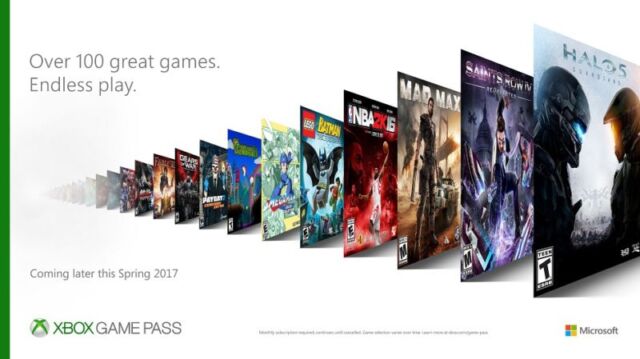
Getty Images
For years now, Microsoft’s Xbox Game Pass has set itself apart by offering subscribers launch-day access to new first-party titles in addition to a large legacy library of older games. That important “day one” perk is now set to go away for all but the highest tier of Game Pass’ console subscribers, even as Microsoft asks for more money for Game Pass across the board.
Let’s start with the price increases for existing Game Pass tiers, which are relatively straightforward:
- “Game Pass Ultimate” is going from $16.99 to $19.99 per month.
- “Game Pass for PC” is going from $9.99 to $11.99 per month.
- “Game Pass Core” (previously known as Xbox Live Gold) is going from $59.99 to $74.99 for annual subscriptions (and remains at $9.99 for monthly subscriptions).
Things get a bit more complicated for the $10.99/month “Xbox Game Pass for Console” tier. Microsoft announced that it will no longer accept new subscriptions for that tier after today, though current subscribers will be able to keep it (for now) if they auto-renew their subscriptions.
In its place, Microsoft will “in the coming months” roll out a new $14.99 “Xbox Game Pass Standard” tier. That new option will combine the usual access to “hundreds of high-quality games on console” with the “online console multiplayer” features that previously required a separate Xbox Game Pass Core subscription (“Core” will still be available separately and include access to a smaller “25+ game” library).
Quick and dirty chart by me to display the new Xbox Game Pass structure (subject to correction).
I hope this helps. pic.twitter.com/Qj6CX7i4kG
— Klobrille (@klobrille) July 10, 2024
But while the current Xbox Game Pass Console option promises access to Xbox Game Studios games “the same day they launch,” those “Day One releases” are conspicuously absent as a perk for the replacement Xbox Game Pass Standard subscription.
“Some games available with Xbox Game Pass Ultimate on day one will not be immediately available with Xbox Game Pass Standard and may be added to the library at a future date,” Microsoft writes in an FAQ explaining the changes.
Players who want guaranteed access to all those “Day One” releases will now have to subscribe to the $19.99/month Game Pass Ultimate. That’s an 81 percent increase from the $10.99/month that console players currently pay for similar “Day One” access on the disappearing Game Pass Console tier.
To be fair, that extra subscription money does come with some added benefits. Upgrading from Game Pass Console/Standard to Game Pass Ultimate lets you use Microsoft’s cloud gaming service, access downloadable PC games and the EA Play library, and get additional “free perks every month.” But it’s the launch day access to Microsoft’s system-selling first-party titles that really sets the Ultimate tier apart now, and which will likely necessitate a costly upgrade for many Xbox Game Pass subscribers.
More problems, more money

While Xbox Game Pass launched in 2017, launch-day access to all of Microsoft’s new first-party games wasn’t promised to subscribers until the beginning of 2018. Since then, loyal Game Pass subscribers have been able to play dozens of brand-new first-party titles at launch, from major franchises like Halo, Forza, and Gears of War to indie darlings like Hi-Fi Rush, Sea of Thieves, and Ori and the Will of the Wisps and much more.
Sure, access to hundreds of older games was nice. But the promise of brand-new major first-party titles was instrumental in driving Xbox Game Pass to 34 million subscribers as of February. And Sony found itself unwilling to match that “day one” perk for its similar PlayStation Plus service, which only includes a handful of older PlayStation Studios titles.
In a 2022 interview with GamesIndustry.biz, PlayStation CEO Jim Ryan said throwing new first-party games on their subscription service would break a “virtuous cycle” in which new full game purchases (at a price of up to $70) help fund the next round of game development. “The level of investment that we need to make in our studios would not be possible, and we think the knock-on effect on the quality of the games that we make would not be something that gamers want.”
And Microsoft may be coming to a similar conclusion. Including first-party titles with cheaper, console-focused Game Pass subscriptions probably seemed like a good idea when Microsoft was still trying to attract subscribers to the service. But Game Pass subscriber growth is starting to slow as the market of potential customers has become saturated. Microsoft now needs to extract more value from those subscribers to justify Game Pass cannibalizing direct sales of its own first-party games.

Activision
And let’s not forget Activision, which Microsoft recently spent a whopping $69 billion to acquire after lengthy legal and regulatory battles. Recouping that cost, while also offering Game Pass subscribers launch day access to massive sellers like Call of Duty, likely forced Microsoft to maximize Game Pass’ revenue-generating opportunities.
“Let’s put it this way: If 7 million Xbox Game Pass subscribers were planning to buy ‘Call of Duty’ for $70 but now have no reason to (as it’s part of their subscription), that leaves almost half a billion dollars of revenue on the table,” MIDia analyst Rhys Elliott told The Daily Upside by way of illustrating the significant numbers involved.
For players who enjoy a wide variety of games and would likely purchase all or most of Microsoft’s first-party titles at launch anyway, Xbox Game Pass Ultimate it still probably a good deal at its increased price. But players who subscribed to a relatively cheap console Game Pass option years ago may want to reevaluate if maintaining that launch day access is now worth $240 a year.





